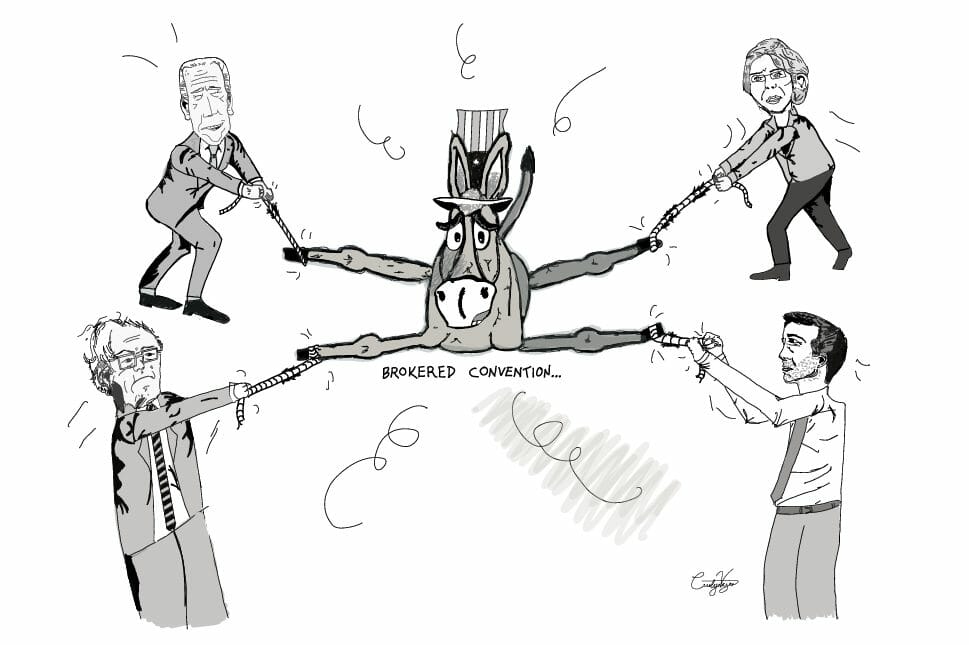Front runners Biden, Warren, Sanders, and Buttigieg vy for the Democratic nomination. (Graphic by Carolyn Vaziri’22)
Democrats are torn. Thirteen primary candidates remain, locking horns for the nomination. The crowded field represents a broad ideological spectrum, from moderates like Amy Klobuchar to far-leftists like Bernie Sanders. Is the safest option to select a moderate to sway conservatives? Or is 2020 the year to gamble with the most liberal? Democrats entered 2020 with one goal: defeat President Donald Trump. Yet they find themselves twenty-two days before the Iowa Caucus with too many candidates holding roses. What could happen as a result of such dangerous indecision?
In the last Democratic primary, the stakes were a little different. On this day in 2016, presidential hopefuls Hillary Clinton and Bernie Sanders were neck-in-neck in Iowa. Clinton, polling at 45.5%, had a very small lead over Sanders, who was just 0.2% behind. Months passed, and despite a close race, party members were quick to get behind Clinton. Sanders’s supporters, nicknamed “Bernie Bros,” were left disenfranchised, holding contempt for Clinton. As a result, more than 1 out of 10 Sanders supporters later voted for Trump.
If Democrats again become attached to certain candidates, could the party become even more fractured and immobilized?
A possible scenario is a brokered convention, which hasn’t happened since 1952.
A brokered convention occurs when a candidate fails to receive 51% of the first round delegate voting by their party’s nominating convention. During a second or third (if it comes to it) round of voting, candidates can withdraw, and delegates can shift their picks. In 1952, Adlai Stevenson didn’t win the nomination until after three rounds of voting, and he went on to lose to General Dwight D. Eisenhower in the general election. It also happened four years earlier in 1948, when it took Republicans three ballots to nominate Thomas Dewey, who lost to Harry S. Truman in the general election.
In 2016, Republicans feared a brokered convention among Donald Trump, Ted Cruz, and Marco Rubio. But sure enough, Rubio eventually lost steam along with the other remaining 10 GOP candidates. By this time in January of 2016, Rubio was many points behind Cruz and Trump in Iowa.
The problem this year, however, is that it’s January, and we still have four major candidates. In January of 2016, it was between Clinton and Sanders and Trump and Cruz, as it was in most recent primary elections.
Vice President Joe Biden, Senator Bernie Sanders, Mayor Pete Buttigieg, and Senator Elizabeth Warren all have a likely shot at the nomination. And this is what could happen:
Buttigieg went from polling at 1.0% in Iowa in March to a 24% lead in December. Currently, Biden, Sanders, Buttigieg, and Warren are within 4.3 points of each other. Similarly, in New Hampshire, the four are less than seven points apart. South Carolina is the only state not reasonably contested, with Biden in a safe lead.
Although Biden has a lead in Nevada, that could change. After President Barack Obama won Iowa in 2008, the tables turned. Clinton had been polling higher, but after Iowa voters determined that Obama wasn’t someone to overlook, the Nevada delegates followed suit. If Buttigieg wins Iowa, he could do the same in Nevada.
Say Buttigieg did win in Iowa. And Sanders won New Hampshire. And Biden won South Carolina. And Nevada went to either Buttigieg or Biden. The party would have no clear favorite before Super Tuesday. Those states could be distributed nearly evenly among the candidates, leaving large-delegate states such as California, Massachusetts, Colorado, North Carolina and Texas up in the air. Even Warren could pull out with California and Massachusetts with her appeal to student-voters and minorities.
A party sees a brokered convention when there are more than two clear-cut candidates and a subsequent split among voters. We are already seeing signs of disunity among groups like the “Bernie Bros” or “Yang Gang.” Sitting at a restaurant this week, I overheard a couple behind me say, “If Biden is the nominee, I won’t vote.”
The Democratic Party did not want to repeat the mistakes of 2016. They welcomed a diverse range of candidates, hoping they would battle it out to find the soul of the Democratic Party. Democrats now find themselves paralyzed with fear, wondering whether there is the “right” candidate.
One thing is for sure. Whoever the Democratic candidate may be, the party must jump on his or her bandwagon. Many of these candidates could beat Trump–but not without party unity.








